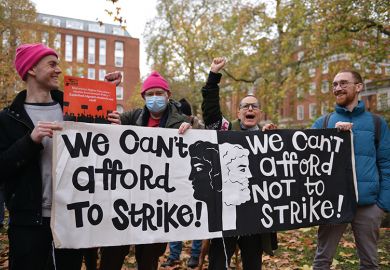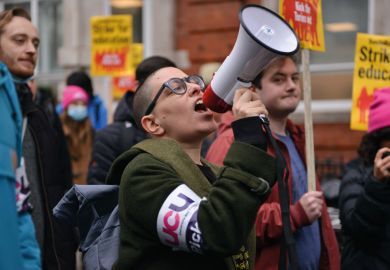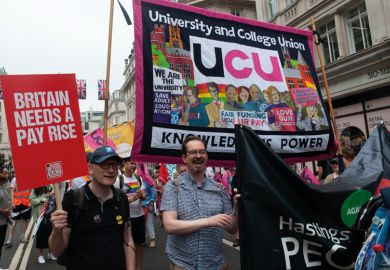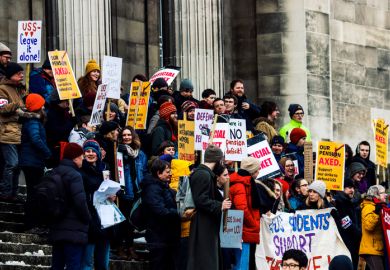The University and College Union faces a “make or break” moment, with the vote for sector-wide strike action showing that many UK higher education workers are “at the end of their tether”, but experts have cautioned that the disputes over pay and pensions are likely to be “bitter and drawn out” with success far from guaranteed.
In results announced this week the union comfortably passed the 50 per cent turnout threshold that is legally required for industrial action in most of the UK, with more than eight in 10 of those polled in two separate ballots supporting walking out.
In total, more than 70,000 staff at 150 universities were balloted, meaning disruption could affect millions of students’ education.
“We aren’t militants and we aren’t greedy. What we are asking for is a share of the billions of pounds that are in reserves,” said Jo Grady, the union’s general secretary. Members “can’t afford to pay their bills, can’t afford to pay their rent and are worried about their mortgages now, and the employers are sitting on billions of pounds of reserves”, she added.
THE Campus views: Breaking barriers for women - enough talking, time for action
While the strikes will be on a much bigger scale than the campus-by-campus walkouts seen in recent years, the results could still be the same, said Nick Hillman, director of the Higher Education Policy Institute.
“This result will cause some chaos on campus but there is no clear evidence to suggest the new industrial action will be any more successful than the previous bouts,” he said.
“While the current political turmoil reminds us that anything can happen, there is a good-ish chance that it [the strikes] will be entirely counterproductive by making universities even less popular in the corridors of power at a time when public spending cuts loom large.”
The union’s previous attempts at industrial action have met fierce resistance from university leaders and have yet to result in significant gains.
While the reversal of cuts to pensions provided by the Universities Superannuation Scheme appears possible after an improvement in the fund’s financial position, bigger wins on pay, casualisation and working conditions appear further off.
Glen O’Hara, professor of modern and contemporary history at Oxford Brookes University, said the result was indicative of the “level of anger and frustration that university staff are feeling”.
But, he said, there was “a lot of feeling around that further strikes won’t get anywhere, that we’ve been striking for years while pay, pensions and conditions have all got progressively worse, and yet still people have voted to go ahead. It’s more of a statement that many people are at the end of their tether than anything else.”
Roger Seifert, emeritus professor of industrial relations at Wolverhampton University, said his sense was that the UCU membership was now both more worried and more determined than at any point in the campaign, given sky-high inflation, risk of further cuts to budgets and the “fraught” pensions issue.
At the same time, senior managers “have to do with less, and have no strategic direction from government with which to move forward”.
This, Professor Seifert said, amounted to a “make or break moment” but added that the combined impact of strikes at every university could be significant, as could the momentum created by strikes in other sectors – some of which have already been settled, with workers enjoying rises of between 8 per cent and 10 per cent.
“Fear and hardship combine, for now, to make disputes more likely, more drawn out, more bitter, and more uncertain,” Professor Seifert said.
“Government turmoil adds to the sense of despair – no help from them, no help from employers, and therefore the only help is from unified collective action.”
Asked if she agreed that the union’s latest campaign represented a crunch point, Dr Grady said she was confident members would back more action if need be.
“UCU has engaged in more strike action than any other union in the last four years and our members are still showing up in bigger numbers than ever before and saying enough is absolutely enough,” she said.
“We are not going anywhere. This dispute is going to get bigger and bigger. We have got more people in the union than ever before, we have got a higher turnout than ever before. When we re-ballot, if we have to, we will get bigger results still. The only people thinking about whether this is the end are the people on the other side of the table to us.”
POSTSCRIPT:
Print headline: UK staff at ‘end of their tether’ as strikes loom
Register to continue
Why register?
- Registration is free and only takes a moment
- Once registered, you can read 3 articles a month
- Sign up for our newsletter
Subscribe
Or subscribe for unlimited access to:
- Unlimited access to news, views, insights & reviews
- Digital editions
- Digital access to THE’s university and college rankings analysis
Already registered or a current subscriber?








